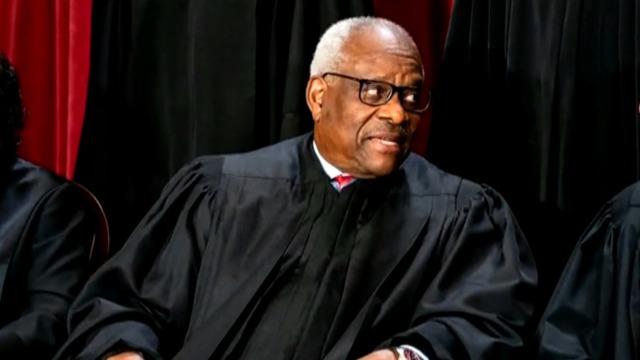Washington — Democrats on the Senate Judiciary Committee are urging Chief Justice John Roberts to open an investigation into luxury trips Justice Clarence Thomas accepted from a GOP megadonor over the years and did not disclose to the public.
“The Senate Judiciary Committee, which has legislative jurisdiction over Federal courts and judges, has a role to play in ensuring that the nation’s highest court does not have the federal judiciary’s lowest ethical standards,” the Judiciary panel’s 11 Democratic members, led by Chairman Dick Durbin, wrote in a letter to Roberts on Monday. “You have a role to play as well, both in investigating how such conduct could take place at the Court under your watch, and in ensuring that such conduct does not happen again.”
The senators said the committee will hold a hearing in the coming days about the “need to restore confidence in the Supreme Court’s ethical standards” and warned they would consider legislative action if the Supreme Court does not act unilaterally. Legislation introduced in both chambers of Congress would, if passed, require the Judicial Conference to create a code of ethical conduct for Supreme Court justices and federal judges.
“But you do not need to wait for Congress to act to undertake your own investigation into the reported conduct and to ensure that it cannot happen again. We urge you to do so,” they told Roberts.
The Supreme Court and Thomas specifically has come under scrutiny after ProPublica reported that the justice and his wife Virginia “Ginny” Thomas have over the past two decades vacationed with Harlan Crow, a Texas real estate magnate and Republican donor. Thomas took trips on Crow’s private plane and luxury yacht, vacationed at his private resort in New York and ranch in Texas, and visited Indonesia with Crow in 2019.
Thomas did not report any of the trips on financial disclosure forms. In a statement Friday, the justice said his friendship with the Crows has spanned more than 25 years, and he acknowledged he and his wife have “joined them on a number of family trips.”
Thomas said that he consulted with his “colleagues and others in the judiciary” early in his tenure at the Supreme Court and “was advised that this sort of personal hospitality from close personal friends, who did not have business before the Court, was not reportable.”
“I have endeavored to follow that counsel throughout my tenure, and have always sought to comply with the disclosure guidelines,” Thomas said. “These guidelines are now being changed, as the committee of the Judicial Conference responsible for financial disclosure for the entire federal judiciary just this past month announced new guidance. And, it is, of course, my intent to follow this guidance in the future.”
The guidance from the Judicial Conference was adopted in March and requires all “judicial officers” and certain judicial employees to file financial disclosures identifying outside income, gifts and other information. While “personal hospitality” gifts are exempt from reporting requirements, the new rules clarified that “personal hospitality” of any individual must be extended for a “nonbusiness purpose” and does not include transportation “that substitutes for commercial transportation.”
The exemption also does not cover gifts “paid for by any individual or entity other than the individual providing the hospitality.”
Revelations about Thomas’ travel and vacations renewed calls from congressional Democrats for the Supreme Court to adopt a code of conduct. While lower court judges are required to adhere to a code of conduct, it does not apply to members of the Supreme Court.
In their letter to Roberts, the Judiciary Committee Democrats said Thomas’ conduct is “plainly inconsistent with the ethical standards the American people expect from any person in a position of public trust.”
